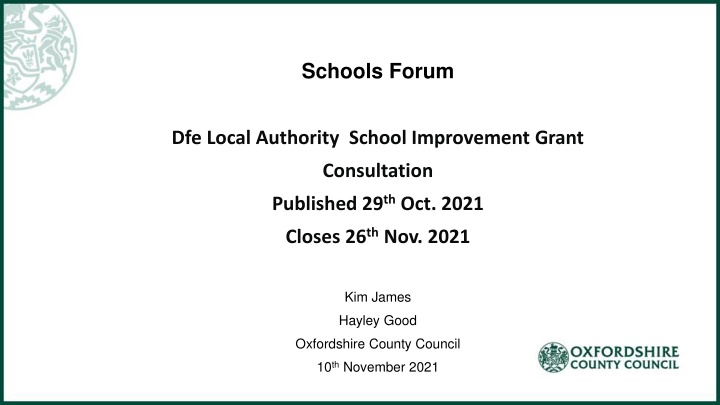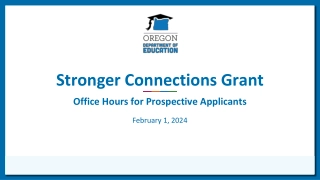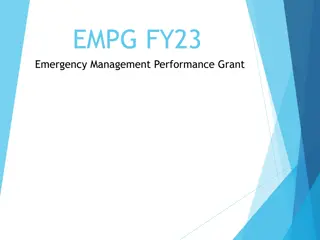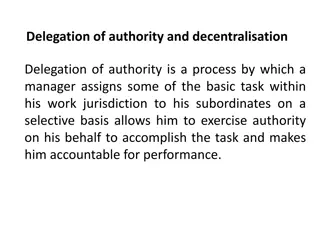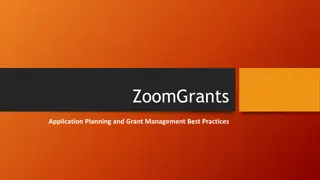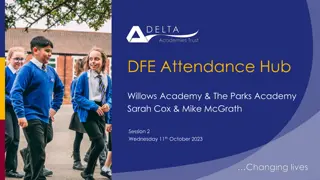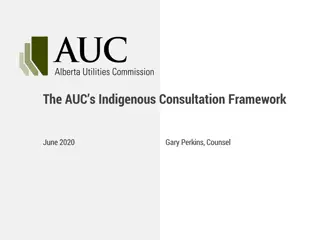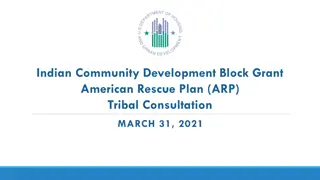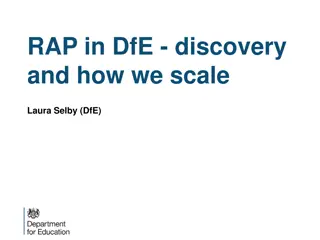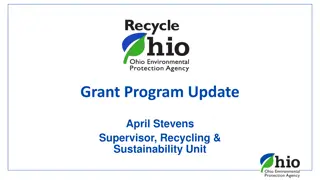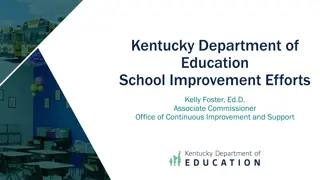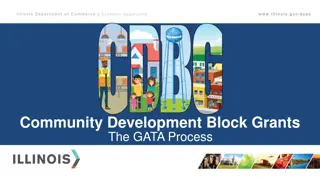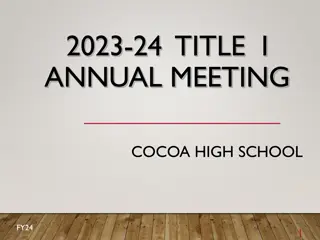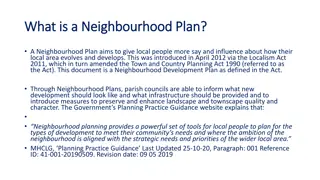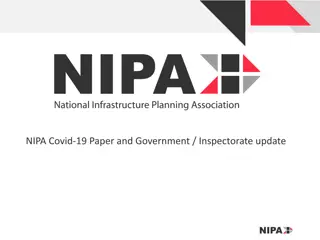Local Authority School Improvement Grant Consultation - DfE Update
The role of local authorities in school improvement is evolving, with a shift towards school-led approaches and revisiting funding models. The Department for Education (DfE) proposes changes to school improvement functions and funding mechanisms. The consultation timeline, including proposed reforms and key dates, is outlined. Feedback and actions from a recent meeting are also highlighted. Share your views on removing the School Improvement Monitoring & Brokering Grant and enabling local authorities to fund school improvement activities for FY 2022-23.
Download Presentation

Please find below an Image/Link to download the presentation.
The content on the website is provided AS IS for your information and personal use only. It may not be sold, licensed, or shared on other websites without obtaining consent from the author.If you encounter any issues during the download, it is possible that the publisher has removed the file from their server.
You are allowed to download the files provided on this website for personal or commercial use, subject to the condition that they are used lawfully. All files are the property of their respective owners.
The content on the website is provided AS IS for your information and personal use only. It may not be sold, licensed, or shared on other websites without obtaining consent from the author.
E N D
Presentation Transcript
Schools Forum Dfe Local Authority School Improvement Grant Consultation Published 29th Oct. 2021 Closes 26th Nov. 2021 Kim James Hayley Good Oxfordshire County Council 10th November 2021
DfE states.... Consultation description The local authority role in school improvement has changed significantly in recent years, with the growth of school-led approaches, such as multi- academy trusts, putting school improvement in the hands of the strongest schools and school leaders. In turn, the local authority role in school improvement in maintained schools is increasingly focused on helping their schools access the support they need from the school system. Given these changes in respective roles and responsibilities, we believe now is the right time to revisit local authorities school improvement functions and how they are funded.
Timeline Date Proposal October 2021 Government consultation launched on proposals for reforming how councils improvement functions are funded. Subject to the outcome of this consultation, our proposed timeline would be to make these changes to the School and Early Years Finance Regulations for FY 2022-23, allowing for a phased removal of the Grant over the course of FY 2022-23 at the end of which it would be expected that all council school improvement activity, including core improvement activities, will be funded via de-delegation, with any non-statutory services which councils choose to continue to offer either provided on a traded basis or also funded through de-delegation. December 2021 / early January 2022 Government publishes its response to the consultation, confirming its intentions. December 2021 / January 2021 Councils agree de-delegation for FY 2022-23 with their schools forums. Provisions made within the School and Early Years Finance (England) Regulations allowing councils to de-delegate to fund all improvement activity, including core improvement activities, from FY 2022- 23 onward. Amendments made to relevant government guidance relating to council school improvement activity. By April 2022 School and Early Years Finance (England) Regulations 2022-23 come into effect, allowing councils to de-delegate for all council school improvement functions. April 2022 The Grant is reduced by 50% on a per school basis. Table 1 Proposed timeline for implementation April 2023 The Grant is removed entirely.
LA actions Meeting with the South East AD 12th Nov FEEDBACK from 12th to Forum ( via e mail ??)
We would like to hear your views on our proposals to: Remove the School Improvement Monitoring & Brokering Grant ( the Grant ), which is currently allocated to local authorities to support school improvement activities; and Make provisions within the School and Early Years Finance (England) Regulations for the financial year (FY) 2022-23 to allow local authorities to fund all of their school improvement activity (including all core school improvement activities) via de-delegation from schools budget shares.
Primary schools ( 125) Maintained Schools Family (+) Secondary school (1) Special schools ( 4) Nursery schools ( 7) VA VC Hospital School (1) CofE diocese Birmingham Diocese ( Catholic ) Portsmouth Diocese (Catholic ) Total maintained 138 Academies
480K maintained schools + Staffing SIP annual visits schools of concern : bespoke school reviews and strategy meetings ( early intervention) Additional leadership support from SIP/ consultant ( linked to needs) New Headteacher support / guidance / coaching Coaching spring / summer term resilience Maths ( Essex ) bespoke, targeted , universal English ( Hampshire) - bespoke, targeted , universal Knowing the standard Subject knowledge English conference SEN Project ( 30 schools pilot) Disadvantaged good practice reviews Service pupil conference and HT networks District based focus eg Abingdon Heads project
Do you agree that this is the case? If not, please explain. 10. We believe that instances of councils exercising formal intervention powers remain relatively low, and that since its introduction, this grant has primarily supported improvement functions such as early support and challenge to improve individual school performance, which overlaps with wider (non-core) improvement provision. Response to question 10
11. We are proposing to (i) remove the Grant (Proposal 1), and (ii) enable councils to de-delegate funds via their schools forum to ensure they are sufficiently funded to exercise all of their improvement activities, including all core improvement activities (Proposal 2). Do you agree that, taken together, these proposals will allow councils to continue to ensure they are adequately funded for core improvement activities; and therefore do not impose a new burden? If not, please explain. Response to question 11 .....there is some uncertainty The Department plans to consult further as part of the review of which council functions should remain discharged by the council or move to be de-delegated or traded.
Response to question 12 12. Bearing in mind Proposals 1 and 2, are there any aspects of our guidance to councils on their role in school improvement which could usefully be clarified to aid understanding of what councils are accountable for with respect to improvement and how it should be funded? (For example, our Schools Causing Concern guidance.)
The LA remain the body that have local knowledge and continue to support and challenge MATs , SATs and maintained schools regarding those with protected characteristics eg SEND , race . Without the LA staff who wil respond to Ofsted complaints , many of which are related to bulling and linked to a protected chac=racteristic. 13. The Public Sector Equality Duty (PSED) requires that public bodies consider the potential effects of key decisions on groups with protected characteristics. The relevant protected characteristics for the purposes of the PSED are: sex; race; disability; religion or belief; sexual orientation; pregnancy or maternity; gender reassignment; and age. Please let us know, providing evidence where possible, if you believe any of the proposals set out in this consultation will have the potential to have an impact on specific groups, in particular those with relevant protected characteristics.
Reforming how local authorities school improvement functions are funded The local authority (referred to here as council ) role in school improvement has changed significantly in recent years, with the growth of school-led approaches, such as Multi-Academy Trusts (MATs), putting school improvement in the hands of the strongest schools and school leaders. In turn, the council s role in school improvement in maintained schools is increasingly focused on helping those of their schools that need it, to access the support they need from the school system. Oxfordshire continues to have a hands on approach but we do reach out to stronger proven providers too. Given these changes in the respective roles and responsibilities of different parties in the school system, we believe now is the right time to revisit councils school improvement functions and how they are funded, and consider what this means for the future of the School Improvement Monitoring & Brokering Grant.
Background: Councils school improvement functions and how they are currently funded Councils school improvement activity can be divided into their core improvement activities and additional improvement services which councils may opt to provide to maintained schools with their agreement. Core improvement activities Since 2017, the Grant has been provided to support councils to fulfil their core improvement activities, with the amount received by each council proportionate to the number of maintained schools in their area. These core improvement activities are set out in Part 4 of the Education and Inspections Act 2006 (the 2006 Act) and on page 36 of our Schools Causing Concern guidance. Part 4 of the 2006 Act provides councils with statutory powers to warn and intervene in schools causing concern, through issuing a warning notice setting out actions the governing body are to take with powers to require the governing body to enter into arrangements; to appoint additional governors; to provide for the governing body to consist of interim executive members; or to suspend the right to a delegated budget, if the governing body fails to take the required action.
The Schools Causing Concern guidance sets out expectations that councils should: Understand the performance of maintained schools in their area, using data as a starting point to identify any that are underperforming, while working with them to explore ways to support progress; Work closely with the relevant Regional School Commissioner (RSC), diocese and other local partners to ensure schools receive the support they need to improve; Where underperformance has been recognised in a maintained school, proactively work with the relevant RSC, combining local and regional expertise to ensure the right approach, including sending warning notices and using intervention powers where this will improve leadership and standards; and Encourage good and outstanding maintained schools to take responsibility for their own improvement; support other schools; and enable other schools to access the support they need to improve. We recently implemented changes to ensure that, in delivering these core improvement activities, councils receiving this grant are supporting educational recovery from the pandemic, and to also adjust the overall value of the Grant to reflect the reduced number of schools for which councils are now responsible.
Additional improvement services Since 2017 councils have also been permitted, with the agreement of their local schools forum, to de- delegate funding from their schools budget shares, to fund the provision of additional improvement services. These are activities that go above and beyond their core improvement activities, and may include, for example, providing or funding access to improvement support. Many councils will also provide additional improvement and other services to schools on a traded basis, where school leaders choose to buy in services provided by the council.
Proposal and rationale The current funding arrangements for council school improvement activity presume that there is a clear distinction between core improvement activities, for which the Grant is provided, and additional activity, which councils fund through de- delegation or as a traded service. We believe this distinction no longer reflects the reality of how effective councils operate. Rather, we believe that, in practice, activity connected to their core improvement activities forms part of a continuum of wider improvement activity that councils may choose to undertake. This is understandable: councils will want to act before performance deteriorates significantly and formal intervention becomes an inevitability, for example, by putting in place arrangements to spot signs of potential underperformance early and challenge it; and only moving on to formal intervention through warning notices and further intervention powers where this hasn t worked and performance has deteriorated.
In that context, and taken together with the Secretary of States responsibility to convert the poorest performing maintained schools (that Ofsted has judged Inadequate ) into academies (for which the council is no longer responsible), it is unsurprising that whilst the vast majority of councils continue to spend the full value of the Grant, instances of councils exercising their intervention powers remain relatively low. This is reflected for example in the number of warning notices issued by councils with less than 1 in 5[1] councils issuing a warning notice in each of the last 3 years. In turn, this implies that the Grant is predominantly used on early challenge and support in cases of potential underperformance, rather than use of formal intervention powers.
We recognise that councils are best placed to determine how to fulfil their core improvement activities but, as a result, we believe there is a strong case to reflect this reality in reformed funding arrangements for councils improvement functions. To achieve this, we are consulting on proposals to remove the Grant and enable all improvement activity, including that provided in connection with their core improvement activities, to be funded in the same way via de-delegation from schools budget shares.
We see a number of benefits to this: It will remove the distinction set out above, which does not reflect the reality of how effective councils operate. In line with our drive towards a school-led improvement system, it will put more decisions about improvement provision to schools into the hands of school leaders (via schools forums). With an average uplift in next year s provisional core school funding allocations of 3.2%, as the beneficiaries of improvement support from councils, we believe it is right that they contribute to the cost of such support but, in turn, they should have greater influence over the activity undertaken. It will bring funding arrangements for councils improvement activity closer into line with the relationship between individual academies and their MATs, which normally top-slice funding to secure improvement support; and support our overarching policy of ensuring maintained schools and academies are funded on an equivalent basis. In turn, this will help to deliver a core aim of the National Funding Formula (NFF), which is to support a more school-based system that allows schools maximum control over their funding. It will also enable councils to adjust over time to the government s longer-term ambition for all schools to become academies within a strong MAT an end point which a number of councils are already closing in on, where councils would no longer maintain schools. We believe that moving at this time to funding these responsibilities via de-delegation, in the same way that councils fund additional improvement services they provide to maintained schools, will provide a smoother transition for councils in this position.
We propose to effect this change through, (1) removing the Grant over the course of FY 2022-23, and (2) including provision in the School and Early Years Finance (England) Regulations for FY 2022- 23 which would allow councils to de-delegate for all improvement expenditure, including all core improvement activities. This consultation seeks views on the impact of both these proposals. In addition, this consultation asks how we can update government guidance to support these changes.
Proposal 1: Removing the Grant We believe the distinction our current funding arrangements effectively make providing an additional grant to councils to support core improvement activities, with additional improvement services funded via de-delegation and traded services - no longer reflects the reality of how councils deliver improvement support to maintained schools, with formal intervention in reality only a small part at the end of a continuum of challenge and support provided by councils. This means funding to support core improvement activities and formal intervention overlaps with wider improvement provision in a way which creates a disparity with how improvement provision is funded in MATs.
Subject to the outcome of this consultation, we are proposing that the Grant would therefore be ended with effect from the start of FY 2023-24, phased so that it would be reduced to 50% of the current amount on a per school basis in FY 2022-23 to give councils and maintained schools time to adjust to these new arrangements. Going forward, in fulfilling their responsibilities for the schools they maintain, councils will continue to be able to draw on wider improvement support that the Department for Education ( the Department ) makes available at low or no cost, including our network of curriculum and behaviour hubs, Teaching School Hubs, National Professional Qualifications providers, Early Career Framework reforms, and our offer of funded support from a National Leader of Education for any school that Ofsted judge requires improvement .
Proposal 2: Including provisions in the School and Early Years Finance (England) Regulations to enable councils to fund all core improvement activities via de-delegation We recognise that, as well as those improvement functions which MATs undertake for academies, part of a council s core functions will continue to be to exercise its statutory intervention powers as appropriate over maintained schools, for which councils cannot currently de-delegate. While instances of councils exercising their statutory intervention powers remain relatively low, we do intend to ensure they remain adequately funded for this, as well as their other improvement functions. Paragraph 8 in Schedule 1 to the School and Early Years Finance (England) Regulations (the Regulations) that apply to FY2021-22 currently prohibits councils from using Dedicated Schools Grant (DSG) funding for expenditure connected to their statutory improvement functions under Part 4 of the 2006 Act. Paragraph 54 in Part 6 of Schedule 2 to the Regulations currently permits councils to de-delegate expenditure on improvement that is not required by Part 4 of the Education and Inspections Act 2006 from schools budget shares, with the agreement of their local schools forum or the Secretary of State.
From FY 2022-23, we propose to give councils the power in the Regulations to fund all improvement activities, including their core improvement activities, via de-delegation of funds from schools budget shares, with the agreement of their local schools forum or the Secretary of State. In practice, we propose doing this by omitting the existing provisions in paragraph 8 in Schedule 1 and paragraph 54 in Part 6 of Schedule 2 of the Regulations from the Regulations for FY2022-23, and including a new provision in Part 7 of Schedule 2 items that may be removed from maintained schools budget shares (primary, secondary and special schools, and pupil referral units) permitting councils to deduct expenditure incurred for the purposes of improvement, including that required by the council s functions under Part 4 of the 2006 Act, from schools budget shares, with the agreement of their schools forum or the Secretary of State. In line with other de-delegation decisions, the Secretary of State would retain the power to approve the de-delegation contrary to the decision of the schools forum, if satisfied that the council had demonstrated such de-delegation was necessary to ensure the council is adequately funded to exercise core improvement activities.
As set out above, this would support our overarching responsibility to ensure maintained schools and academies funding arrangements are more closely aligned; and would provide a smoother transition as more schools become academies and move out of council control. Making this change would also align with the proposed reforms to the NFF on which the government has recently consulted. That consultation proposed reviewing central school services with a view towards retaining funding by central grant as part of the Central School Services Block where responsibilities are to all schools, and de-delegating central functions that are provided only in support of maintained schools. The Department plans to consult further as part of the review of which council functions should remain discharged by the council or move to be de-delegated or traded.
Clarifying guidance provided to councils with respect to school improvement As part of these changes, we would also intend to update guidance provided to councils with respect to their improvement activities in maintained schools, to ensure guidance reflects these new funding arrangements. We are therefore keen to use this opportunity to seek views on where guidance can usefully be clarified to aid understanding of what councils are accountable for with respect to improvement, where these activities can be scaled in response to need, and the scope for councils and schools forums to agree how these responsibilities are carried out and funded. For example, we are keen for views on how we might best update our Schools Causing Concern guidance.
Timeline Date Proposal October 2021 Government consultation launched on proposals for reforming how councils improvement functions are funded. Subject to the outcome of this consultation, our proposed timeline would be to make these changes to the School and Early Years Finance Regulations for FY 2022-23, allowing for a phased removal of the Grant over the course of FY 2022-23 at the end of which it would be expected that all council school improvement activity, including core improvement activities, will be funded via de- delegation, with any non-statutory services which councils choose to continue to offer either provided on a traded basis or also funded through de-delegation. December 2021 / early January 2022 Government publishes its response to the consultation, confirming its intentions. December 2021 / January 2021 Councils agree de-delegation for FY 2022-23 with their schools forums. Provisions made within the School and Early Years Finance (England) Regulations allowing councils to de-delegate to fund all improvement activity, including core improvement activities, from FY 2022- 23 onward. Amendments made to relevant government guidance relating to council school improvement activity. By April 2022 School and Early Years Finance (England) Regulations 2022-23 come into effect, allowing councils to de-delegate for all council school improvement functions. April 2022 The Grant is reduced by 50% on a per school basis. Table 1 Proposed timeline for implementation April 2023 The Grant is removed entirely.
